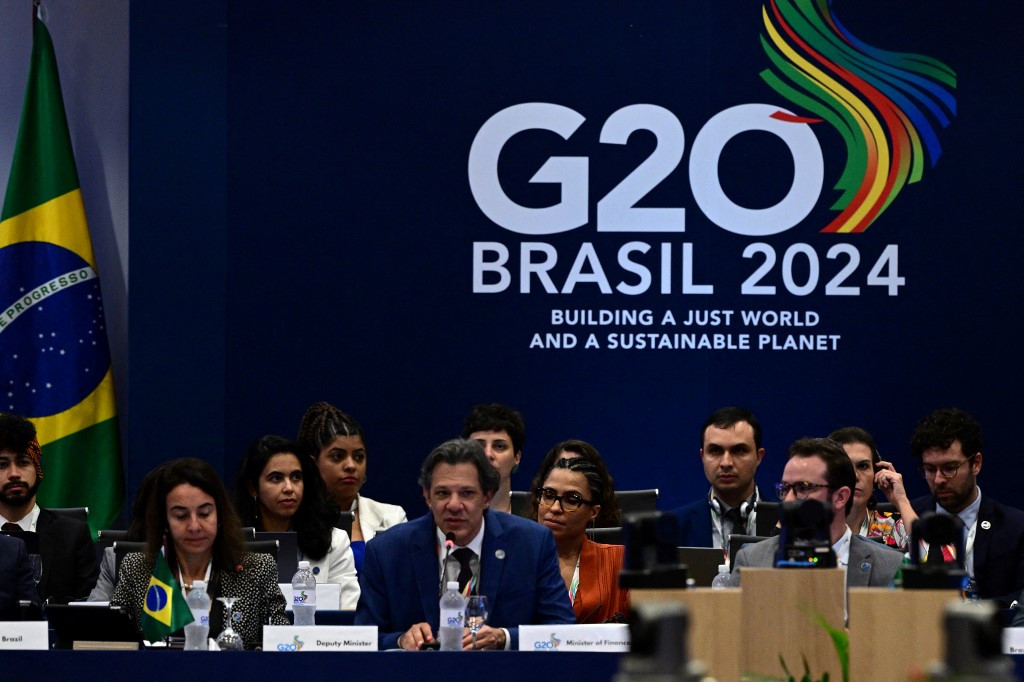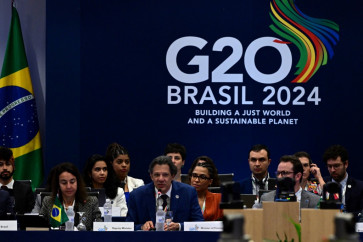Popular Reads
Top Results
Can't find what you're looking for?
View all search resultsPopular Reads
Top Results
Can't find what you're looking for?
View all search resultsGlobal economic challenges and the G20's role
Urgent reforms for MDBs are needed to enhance their effectiveness in achieving SDGs and tackling global and regional issues.
Change text size
Gift Premium Articles
to Anyone
 Brazil's Economy Minister Fernando Haddad speaks during the G20 Ministerial Meeting in Rio de Janeiro, Brazil, on July 25, 2024. G20 finance chiefs meeting in Rio de Janeiro diverged over the idea of a coordinated wealth tax, promoted by Brazil but opposed by the United States, that advocates that each country should adopt its own “fair and progressive“ tax system. (AFP/Pablo Porciuncula)
Brazil's Economy Minister Fernando Haddad speaks during the G20 Ministerial Meeting in Rio de Janeiro, Brazil, on July 25, 2024. G20 finance chiefs meeting in Rio de Janeiro diverged over the idea of a coordinated wealth tax, promoted by Brazil but opposed by the United States, that advocates that each country should adopt its own “fair and progressive“ tax system. (AFP/Pablo Porciuncula)

The recent Group of 20 (G20) Finance Ministers and Central Bank Governors (FMCBG) meeting in Rio de Janeiro, Brazil, concluded with a significant communiqué, the first-ever issued under the Brazilian G20 presidency. This gathering highlighted critical challenges and risks confronting the global economy.
Addressing these issues with urgency is essential as the world faces ongoing economic uncertainties. The global economic landscape is fraught with perils, from economic fragmentation to volatile financial markets driven by prolonged high interest rates, demanding immediate and decisive action.
Global economic risks remain pervasive, with economic fragmentation looming large. Geopolitical tensions and economic rivalries among major powers, such as the United States-China trade war, threaten to unravel the integrated global economic system that has been the bedrock of prosperity for decades. This potential fragmentation could disrupt trade, investment flows and supply chains, essential for global stability and growth.
The G20's role in fostering cooperation is crucial to avert such a divide.
Uncoordinated fiscal-monetary policies in advanced countries lead to high interest rates and financial instability. Higher interest rates, while necessary to combat inflation, increase borrowing costs and create financial instability.
Emerging markets, including Indonesia, face capital outflows as investors seek safer assets in developed markets. For instance, emerging markets are expected to experience a capital outflow of about US$200 billion in 2024. The FMCBG communiqué emphasizes the need for clear policy communication to mitigate negative spillovers, but proactive measures are needed to protect emerging markets from volatile capital flows.
Elections worldwide are complicating the economic landscape. Some advanced countries are mixing politics with monetary policies, threatening the independence of central banks, which is vital for monetary and financial stability. Political interventions may undermine their ability to ensure price stability and financial integrity. The FMCBG discussed this issue, and the communiqué reaffirms central bank independence, but stronger safeguards are needed.


















